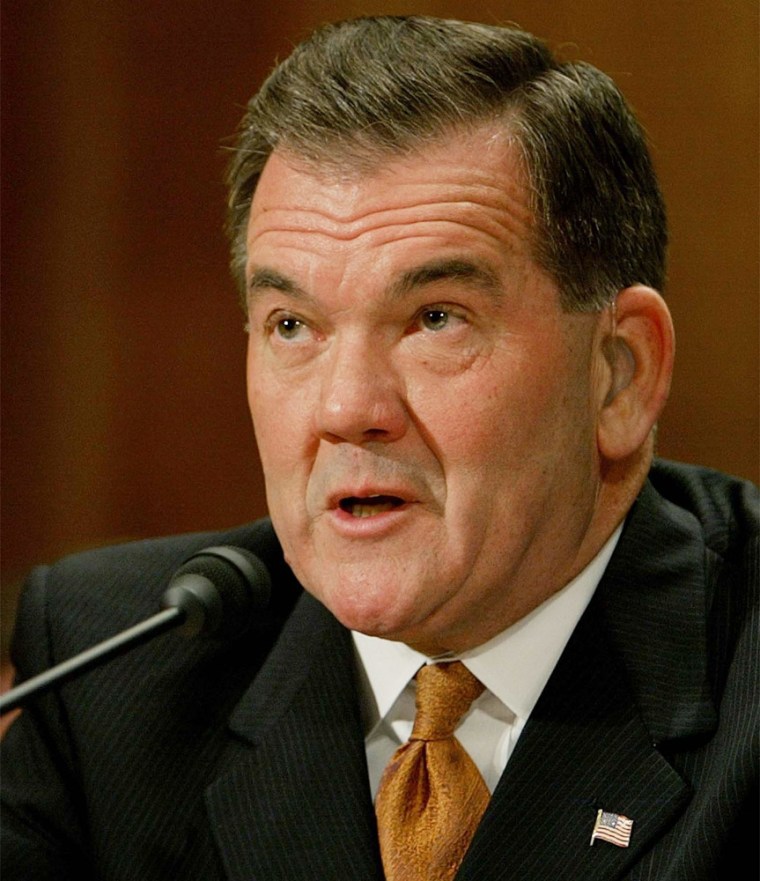President Bush’s proposed homeland security budget shortchanges the nation’s first line of defense against terrorism and either cuts back or eliminates several other vital security programs, members of a Senate panel said Monday.
The DHS budget includes “a stunning 30 percent cut, government-wide, for first responders that is the latest evidence of shortchanging the homeland side of the war against terrorism,” warned former Democratic presidential candidate Sen. Joseph Lieberman, D-Conn.
Homeland Security Secretary Tom Ridge defended the funding proposals, saying the administration took a hard look at the realities of the times and made tough choices “by the balancing of the fiscal and security environment,” Ridge said.
Ridge also deflected criticism of the administration’s budget by promising that his agency will make it a priority to “break the logjam” that is keeping $8 billion to $9 billion allocated by Congress from reaching state and local firefighters, police and medical personnel.
Ridge made the promises during congressional testimony in which he defended the administration’s spending decisions as outlined in the president’s proposed $40.2 billion budget for DHS for fiscal year 2005. Ridge’s testimony Monday before the Senate Governmental Affairs Committee is the first of six appearances he’ll make in the next two weeks before various House and Senate panels.
The DHS budget drew bipartisan criticism Monday for various programs it cut completely — such as funding for SafeComm, a grant program to help ensure that first responder communications are interoperable — to those it scaled back dramatically, such as the $1.6 billion (30 percent) cut in key grant programs to first responders.
There’s still money on the table waiting “to be drawn down,” Ridge said. However, there’s a snag, Ridge said. “[D]epending on the state, there are different reasons for the delay [in getting money to the first responders.] And we’re going to take it upon ourselves, with our [state and local] partners, to try and break the logjam and come up with a standard means of distribution,” Ridge said, so that “the first responders will never say again, ‘It’s taking too long to get those dollars to us.’”
Time-consuming terrorist hunting
Ridge Monday also acknowledged an intelligence snafu during the holidays, when the national terrorist threat level was raised to orange or “high alert” status and several flights to the United States from France, Britain and Mexico were canceled.
Passenger manifests from those international flights were checked by hand by U.S. intelligence analysts at the new Terrorism Screening Center because the government doesn’t yet have a single, consolidated terrorist watch list, Ridge said.
“The physical consolidation or technological consolidation of all watch lists in one place will continue to take several months,” Ridge said. “So right now in the terrorist screening center, we literally have a very labor-intensive [task] … where, when we call upon the terrorist screening center to identify a name, we have individuals in front of a screen running over the individual names” by hand, Ridge said, checking names against the government’s dozen different watch lists. “I believe our goal is to get the names aggregated into a single database by midsummer,” Ridge told the Senate panel.
Some senators expressed concern that DHS wasn’t receiving timely intelligence owing to a government reorganization that created several new anti-terrorism and analysis units.
“It looks to me like you're losing the turf battle within this administration,” said Sen. Richard Durbin, D-Ill.
But Ridge took exception. “What you should know is that part of the fusion operation that we do in the information analysis department or unit within Homeland Security is that we have access to the information generated by the entire intelligence community,” Ridge said. “The decision to raise the threat level over the holidays was because of the partnership and the access to information generated by the broader intelligence community.”
Give and take
Ridge also took heat over the 8 percent budget increase for the Coast Guard and the particular funding decisions relating to bioterrorism.
Sens. Lieberman and Susan Collins, R-Maine, who chairs the committee, both sharply questioned why DHS appeared to be underfunding the Coast Guard in light of several independent studies showing it would take billions of dollars to secure the nation’s ports and to replace a Coast Guard fleet that is aging and increasingly costly to maintain and repair.
“As we said, priorities within the department are precisely where we think we need to be,” Ridge said. “We're quite aware of the fact that we have cutters that need repair and that their maintenance costs continue to increase because of the age of some of this equipment,” Ridge said. Despite that, “we're quite comfortable, given the nearly $500 million that we've requested the Congress to appropriate, that we'll continue to maintain the same level of service in both the homeland security and the non-homeland security areas.”
Lieberman accused the administration of “cannibalizing existing bioterrorism programs” to fund its recently proposed national biosurveillance program. “The most unacceptable act of cannibalization, to me, is the $105 million cut in bioterrorism preparedness grants to state and local health departments which, again, are our first line of defense, first responders,” Lieberman said, also noting another $39 million being cut in money that could go to develop “hospital surge capacity” response in case of a bioterror attack.
Ridge disagreed, saying there was “money in the pipeline” for such programs and again noted the administration had to make choices based on national priorities.
“It was clearly the consensus view of [Health and Human Services] Secretary [Tommy] Thompson and myself that we both had a responsibility to develop a comprehensive national system to make ourselves aware, as early as possible, about the presence of a biological agent,” Ridge said, “regardless of whether the pathogen or that agent is brought to us by a terrorist or by Mother Nature.”
